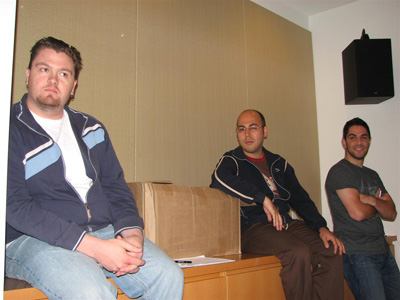Conversations with Developers
There are obviously a lot of things different about Red Alert 3 that are of note. Some of these are directly related to the gameplay so I can’t talk about them yet, but there are some broad points worth discussing. Foremost among these is the transition to a more humorous, less serious game. This has definitely been a key focus of Red Alert 3, and the theme showed up in nearly every presentation. Towards the end of the summit, I talked to Greg Black, the Lead Balance Designer, and Greg Kasavin, a producer mentioned earlier, about it. Both assured me that the development team as a whole was very much on board with the switch in styles, though I’m sure they were not going to discuss any dissent in the ranks with a community member. Still, taking them at their word, it is interesting to consider the motivations behind the switch in styles and what it will mean for the game in the end.


Left to right: Greg Black (Lead Balance Designer), an unknown developer, Greg Kasavin and Amir Ajami (Producers)
Greg Black stated that the team felt that this was the natural way to go after Red Alert 2, and there’s some reason for this. Certainly, EA is trying to draw a contrast between this game and C&C 3—and they’ve succeeded. Greg Black also said that he felt that the gameplay was markedly different from the other RTS games out on the market, which are almost exclusively serious games that, if not realistic, are certainly not overly light-hearted (some would say not fun), though both Greg’s said they weren’t letting the other games style impact how they approached Red Alert 3. Also notable is the developers’ awareness of the state of the US market, which, in their minds, did not want an overly morbid war game, given America’s global situation with two wars going poorly. The developers clearly feel that the team’s personal preference, the marketing climate, and the fans’ desire all point towards a game that tries to outdo Red Alert 2 in craziness and light-heartedness.
I do not know if I agree with this decision, but I think that signs show that they are thinking through the implications of it. Most heartening was the fact that, even with the crazy Red Alert 3 universe, the characters and units attempt to be believable and consistent. In short, though they do not question some of the more absurd parts of their universe, they act in typical, rational, and believable ways within it. This ties in with Greg Kasavin’s presentation and the goal of adding depth and believability to each unit. Ultimately, I still question the decision, even if it is implemented well. I think there’s only so many times a parachuting armored bear is funny or a once-clever line of humorous dialogue can be repeated before fans demand more realism and depth. In any event, as I said to the developers, the place where this style will be best evaluated is in the campaign—of which we saw nothing. So, until then, it is too early to judge, yet my early read is that the decision is not the best one. Nonetheless, if you were looking for an even more outlandish version of Red Alert 2, this game will deliver that well, given the amount of thought the developers I talked to displayed.

Community members signing non-disclosure agreements at the end of the summit, while Greg Black looks on
Conclusions
I thank Aaron for the opportunity to go to EALA. I recognize that I was supposed to represent a lot of people there, which is why I asked the questions I did, even if they were unpopular. I hope EA felt that I gave them a fair shot to show what they were working on, but also that I—and other fans—were going to think critically about what they had to offer. Bottom line: I had fun at EA, listening to developers, asking questions, talking to other fans, and playing the game. I have my concerns still, particularly with the humorous nature (I will write more about that this summer once the beta test comes out, perhaps), and a lot of the mod and patch support. I think there is a ways to go with the game, and, from the presentations I saw, the developers recognize this as well. There is not a great deal of time left. The game missed its Alpha milestone, yet all developers, if they commented at all, said that the game would be done by the October 2008 release date—in part feeding my concern about a rushed game and poor support. Yet I am convinced that the team and EA know what it takes to make a quality game with quality support. Red Alert 3 could well be this game and it could be more. It is a question of time, resources, and commitment from the corporate structure.
There are a lot of factors at play in the making of this game and much of it is still in flux as the game continues to be developed. With so much up in the air, all I can say is this: I was impressed by the developers with whom I talked, I was generally impressed by their work, and I am looking forward to learning more about the game and playing the beta this summer. I hope, from this article, you can understand why.


Leaving the lush scenary of EALA and the West Coast